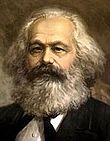- Means of labor
-
Part of a series on Marxism  Social sciencesAlienation · Bourgeoisie
Social sciencesAlienation · Bourgeoisie
Base and superstructure
Class consciousness
Commodity fetishism
Exploitation · Human nature
Ideology · Proletariat
Private property
Reification · Cultural hegemony
Relations of production
Scientific socialism
ImmiserationCapitalist mode of production
Socialist mode of production
Capital accumulation
Commodity (Marxism)
Marxian economics
Communism
Economic determinism
Labour power · Law of value
Means of production
Mode of production
Perspectives on Capitalism
Productive forces
Surplus labour · Surplus value
Transformation problem
Wage labour · Crisis theoryHistoryCategoriesAll categorised articlesCommunism portal 
Means of labor is a concept in Marxist political economy that refers to "all those things with the aid of which man acts upon the subject of his labor, and transforms it." (Institute of Economics of the Academy of Sciences of the U.S.S.R., 1957) Means of labor include tools and machinery (the "instruments of production"), as well as buildings and land used for production purposes and infrastructure like roads and communications networks and so forth.
The means of labor are one of three basic factors of the production process (Marx, 1967, p 174), along with human labor, and the subject of labor (the material worked on).
In some formulations, the means of labor and human labor (including the activity itself, as well as the skills and knowledge brought to the production process) comprise the productive forces of society (e.g., Sheptulin, 1978), other formulations define productive forces more narrowly as the union of instruments of production and the workers who wield them (e.g., Institute of Economics, 1957).
References
- Institute of Economics of the Academy of Sciences of the U.S.S.R. (1957). Political Economy: A Textbook. London: Lawrence and Wishart.
- Marx, Karl (1867 | 1967). Capital Vol. I. New York: International Publishers. Internet copy.
- Sheptulin, A. P. (1978). Marxist-Leninist Philosophy. Moscow: Progress Publishers.
Categories:- Marxist terminology
- Political economy
Wikimedia Foundation. 2010.
